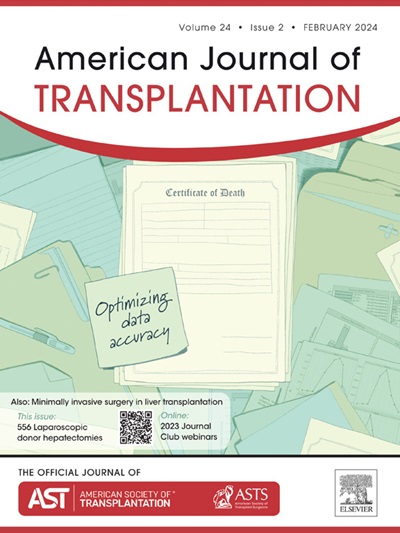Recommendations to Overcome Barriers to Transplant Fellowship Training: A Report from the American Society of Transplantation Fellows Task Force.
IF 8.9
2区 医学
Q1 SURGERY
引用次数: 0
Abstract
With the expansion of solid organ transplantation activities in the US, there is a critical need for more transplant care providers and trainees to sustain and advance the field of transplantation. However, there has been a pending shortage of trainees pursuing transplant fellowship training in the U.S. in recent years. To address this issue, the American Society of Transplantation (AST) organized the Fellows' Task Force, including representatives of all four major organs from various AST communities of practice, to understand the drivers of this pending shortage and develop strategies to increase interest in transplant specialization. The task force identified four areas of focus, including early & sustained exposure to transplant medicine, awareness through education, flexible fellowships & pathways to transplant, and work/life resources. Based on these focus areas, the task force developed recommendations and action items, which were compiled into a report to be implemented by individuals, institutions, communities of practice (work groups), and societies such as the AST. We hope that this report will be the first step in overcoming barriers and concerns to encourage the pursuit of specialization in transplantation in the US.克服移植研究员培训障碍的建议:一份来自美国移植研究员协会工作组的报告。
随着美国实体器官移植活动的扩大,迫切需要更多的移植护理提供者和培训人员来维持和推进移植领域。然而,近年来,在美国寻求移植奖学金培训的学员一直存在短缺。为了解决这一问题,美国移植学会(AST)组织了研究员工作组,包括来自不同AST实践社区的所有四个主要器官的代表,以了解这一未决短缺的驱动因素,并制定策略以增加对移植专业化的兴趣。工作组确定了四个重点领域,包括早期和持续接触移植医学,通过教育提高认识,灵活的奖学金和移植途径,以及工作/生活资源。基于这些重点领域,工作组制定了建议和行动项目,这些建议和行动项目被汇编成一份报告,由个人、机构、实践社区(工作组)和协会(如AST)实施。我们希望这份报告将成为克服障碍和关注的第一步,鼓励在美国追求移植专业化。
本文章由计算机程序翻译,如有差异,请以英文原文为准。
求助全文
约1分钟内获得全文
求助全文
来源期刊
CiteScore
18.70
自引率
4.50%
发文量
346
审稿时长
26 days
期刊介绍:
The American Journal of Transplantation is a leading journal in the field of transplantation. It serves as a forum for debate and reassessment, an agent of change, and a major platform for promoting understanding, improving results, and advancing science. Published monthly, it provides an essential resource for researchers and clinicians worldwide.
The journal publishes original articles, case reports, invited reviews, letters to the editor, critical reviews, news features, consensus documents, and guidelines over 12 issues a year. It covers all major subject areas in transplantation, including thoracic (heart, lung), abdominal (kidney, liver, pancreas, islets), tissue and stem cell transplantation, organ and tissue donation and preservation, tissue injury, repair, inflammation, and aging, histocompatibility, drugs and pharmacology, graft survival, and prevention of graft dysfunction and failure. It also explores ethical and social issues in the field.

 求助内容:
求助内容: 应助结果提醒方式:
应助结果提醒方式:


